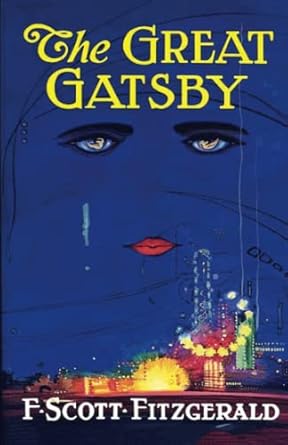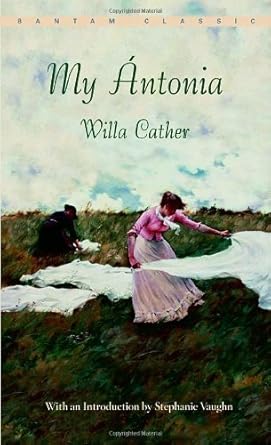5 Adult Novels for Catholic Homeschoolers
Mr. Campbell’s Five Favorite Adult Novels
Last year, I wrote an article on seven books that made me fall in love with history. Then, back in the spring, I posted on five of my favorite books that influenced me as a child. Today, I’d like to follow up with a parent booklist. One for you! Too often, homeschool parents are so busy reading children’s books that they don’t take time for their own literary enrichment. I’m here today to help you remedy this with a quick booklist of my five favorite adult novels.
Narrowing it down was hard because I’ve read so much great literature in my lifetime. If I had more space, I could include so many others! I have returned to each of these books multiple times, drawing more from them with each subsequent reading.
5. The Possessed by Fyodor Dostoevsky
 The Russian novelist Fyodor Dostoevsky (1821-1881) is best known for his masterpiece Crime and Punishment (with his murder mystery The Brothers Karamazov coming in a close second). I came upon Dostoevsky by osmosis. When I was first discovering Catholicism as a young man, every Catholic intellectual I knew told me, “Dude, you gotta read Dostoevsky.” I remember I joined a book club with some young men from my parish, and the first book they chose was his Brothers Karamazov. Immediately, I fell in love with Dostoevsky’s style, his dreary yet meaningful settings, masterful dialogues, and insight into human psychology. I read Brothers Karamazov twice, tackled Crime and Punishment, Notes from the Underground, and his other short stories—all of which I read multiple times.
The Russian novelist Fyodor Dostoevsky (1821-1881) is best known for his masterpiece Crime and Punishment (with his murder mystery The Brothers Karamazov coming in a close second). I came upon Dostoevsky by osmosis. When I was first discovering Catholicism as a young man, every Catholic intellectual I knew told me, “Dude, you gotta read Dostoevsky.” I remember I joined a book club with some young men from my parish, and the first book they chose was his Brothers Karamazov. Immediately, I fell in love with Dostoevsky’s style, his dreary yet meaningful settings, masterful dialogues, and insight into human psychology. I read Brothers Karamazov twice, tackled Crime and Punishment, Notes from the Underground, and his other short stories—all of which I read multiple times.
During this time, I kept coming across references to another book, The Possessed, in the works of other writers. It was always getting quoted. When I saw the Jesuit theologian Henri de Lubac devote an entire section to it in his book on atheist humanism, I decided to pick up a copy of The Possessed. I was not disappointed!
The Possessed is, in many ways, Dostoevsky’s darkest work—which is saying a lot for a Russian author who already has a reputation for depressing content. Dostoevsky’s books are always multi-faceted and complex to summarize. It is about a circle of atheist revolutionaries hatching a plot to launch a coup. The book explores the implications of clashing worldviews acted out between a panoply of vivid characters, many downright neurotic. The Possessed was a book that disturbed me but in the best possible way. It strips away the platitudes to get to the heart of what the difference between good and evil truly means.
4. The Silmarillion by J.R.R. Tolkien
 Putting Tolkien on a list of favorite novels may be a little cliche, but what can I say? The Silmarillion was an instant favorite of mine from the first moment I picked it up.
Putting Tolkien on a list of favorite novels may be a little cliche, but what can I say? The Silmarillion was an instant favorite of mine from the first moment I picked it up.
Tolkien’s Silmarillion is essentially the Old Testament of Middle Earth, providing the historical and mythological framework for understanding The Lord of the Rings and The Hobbit.
What hooked me about The Silmarillion was the style of composition. Unlike the novel format of LOTR, The Silmarillion is written in what I would call the archaic or “high epic” style—which is to say, Tolkien wrote it as if you are reading epic literature from Middle Earth. While some readers gripe about this (the people who have started The Silmarillion but have been unable to complete it are legion), I found the style eminently suitable for expressing such mythic content as the Song of Eru Iluvatar, the corruption of Morgoth, the journeys of the Eldar, the story of Beren and Luthien, and the Fall of Gondolin. It helped create a sense of place, such that Middle Earth “feels” more real than all of the fantasy worlds created by other authors.
Tolkien was simply a master at weaving history, prose, poetry, and literary themes together into a rich and meaningful narrative that is a work unparalleled. I’ve returned to it many times over the years, each time with more profound joy.
I should also note by way of a shameless plug, Tolkien’s Silmarillion was influential in my own literary journey, as I utilized his epic narrative style in my own two fantasy books, Tale of Manaeth and Paladologies.
3. Pride and Prejudice by Jane Austen
 I admit I was skeptical of Jane Austen at first. My young and immature view of Austen was that her books were frivolous romance novels filled with fluff and sentimentality. I viewed it as the kind of book that appealed to the air-headed, romance-obsessed who ironically show up so frequently as side characters in Austen’s works.
I admit I was skeptical of Jane Austen at first. My young and immature view of Austen was that her books were frivolous romance novels filled with fluff and sentimentality. I viewed it as the kind of book that appealed to the air-headed, romance-obsessed who ironically show up so frequently as side characters in Austen’s works.
Of course, the main problem with my thesis was that I had never actually read any of Austen’s books. Like many, I was introduced to her through the 1995 Pride and Prejudice miniseries starring Jennifer Ehle and Colin Firth. A guy at my parish loaned it to me, and I instantly fell in love with it! He had the DVD boxed set, so there was a book and all this supplemental material for me to read about the story, setting, actors, and production. To this day, I still think the 1995 miniseries is one of the best pieces of television programming ever. It holds up phenomenally well almost thirty years on.
From there, I simply had to read the book. I was delighted to find that Pride and Prejudice, the book, is just as engaging as the movie. Far from saccharine romance for an air-headed audience, the book is a profound study of human nature and how our biases and insecurities cause a breakdown in our relationships. Conversely, the journey of self-discovery that allows us to recognize and repent of these flaws lays the groundwork for wholesome, respectful relationships. Like Dostoevsky, Jane Austen was a master of psychology who understood the subtleties of human motivation and could expertly weave them into the plot of her stories. They thus become deeply insightful analyses of human nature. Pride and Prejudice remains my favorite Austen novel, but any one of her works is gold.
2. The Great Gatsby by F. Scott Fitzgerald
 The Great Gatsby by F. Scott Fitzgerald (1896-1940) was the only book on this list that I did not like at first. Like many Americans, my first exposure to The Great Gatsby was upon being forced to read it in high school. I didn’t think much of it then. I found it rather “meh” and would likely not have revisited it. Then, I was forced to reread it in my college American literature class. I found it slightly more interesting, probably due to the presence of a knowledgeable literature professor who could unpack some of its themes. Still, whatever was so grand about it was not evident to me; it was more than others kept pressing it on me and telling me it was great.
The Great Gatsby by F. Scott Fitzgerald (1896-1940) was the only book on this list that I did not like at first. Like many Americans, my first exposure to The Great Gatsby was upon being forced to read it in high school. I didn’t think much of it then. I found it rather “meh” and would likely not have revisited it. Then, I was forced to reread it in my college American literature class. I found it slightly more interesting, probably due to the presence of a knowledgeable literature professor who could unpack some of its themes. Still, whatever was so grand about it was not evident to me; it was more than others kept pressing it on me and telling me it was great.
A few years passed, and I picked up a used copy and decided to give it another go when I was in my early thirties. This time around, I was deeply impressed by the themes of nostalgia, regret, loss, and attempts to reclaim missed opportunities. I don’t know why I didn’t pick up on these before; I think the book had always been pitched to me as a narrative about the Roaring Twenties—which it is, of course, but we must not confuse the setting with the theme. The Roaring Twenties form the backdrop for a story that is truly about the attempt of jaded adults to reclaim the promise and adventure of youth.
Perhaps, as an older man, I was better suited to appreciate such themes. Whatever the reason, I started to love the book. I decided to reread it a decade later, now in my forties. I was absolutely floored by Fitzgerald’s prose’s wistful, aching beauty. This time, I realized that The Great Gatsby is simply one of the best-written books I’ve ever read from a technical perspective. Fitzgerald’s use of language is evocative and flawless. Not a single sentence is wasted. The images he crafts are perfect for what he’s trying to accomplish. Reading The Great Gatsby now is not only enjoyable but cathartic. It is a trip through a landscape filled with golden nostalgia that makes you feel all the feelings.
1. My Antonia by Willa Cather
 In reserving the number one spot for Willa Cather’s My Antonia, I am saving the best for last because this is undoubtedly my favorite novel. Most Catholics know Willa Cather (1873-1947) for her Death Comes for the Archbishop, a vivid story about Catholic missionaries in New Mexico. I was unaware of My Antonia until I took a college American literature course (the same one that forced me to read The Great Gatsby) and was assigned the book.
In reserving the number one spot for Willa Cather’s My Antonia, I am saving the best for last because this is undoubtedly my favorite novel. Most Catholics know Willa Cather (1873-1947) for her Death Comes for the Archbishop, a vivid story about Catholic missionaries in New Mexico. I was unaware of My Antonia until I took a college American literature course (the same one that forced me to read The Great Gatsby) and was assigned the book.
My Antonia was Willa Cather’s favorite of all her works. “The best thing I’ve done is My Antonia,” Cather said. “I feel I’ve made a contribution to American letters with that book.”
Like The Great Gatsby, it takes time to unpack what My Antonia is really about. On its face, it tells of the experiences of Antonia, a Catholic Czech immigrant girl trying to get by on the great plains of Nebraska, as told through the eyes of the novel’s protagonist, Jim. However, on a deeper level, My Antonia is a beautifully written coming-of-age story. As such, it is deeply nostalgic, colored with emotive descriptions of the Great Plains. It makes something in you pine away for lost innocence in a hazy, golden neverland. Every aspect of her writing is masterful—the dialogue, setting, characters, and the simple use of language. I’ve returned to this book many times over my life, and I drink deeply from its beauty every time.
Conclusion
There’s so much more I could share! Flannery O’Connor’s The Violent Bear It Away and C.S Lewis’s Till We Have Faces deserve honorable mentions. Maybe I will have to return to this theme for a second round. In the meantime, make sure you are making time for your own non-homeschool-related reading. If you’re truly crunched on time, all of these are available on audio, which you could listen to while driving or doing chores.
Do you have book titles to share? Or perhaps you want to connect with other Catholic homeschool parents to see what they’re reading. If so, I invite you to join our Catholic Homeschool Connections Community and start a conversation.






